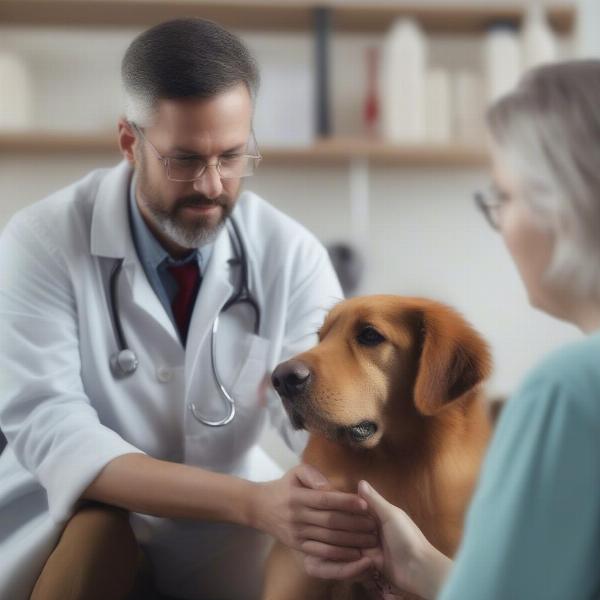The search term “how to get a dog horny” often indicates a misunderstanding of canine reproductive behavior. While the phrasing might suggest an attempt to artificially induce arousal, it’s crucial to approach the topic from a responsible perspective, focusing on understanding natural canine reproduction, responsible breeding practices, and the potential dangers of interfering with these natural processes. This article aims to address the user’s query by providing accurate information about canine reproduction, dispelling common myths, and emphasizing ethical considerations.
Understanding the Canine Reproductive Cycle
A dog’s reproductive cycle is complex and differs significantly from human reproduction. Female dogs, or bitches, experience estrus, commonly known as “heat,” roughly twice a year. This period, lasting several weeks, is when they are receptive to mating. Recognizing the signs of estrus is key for responsible pet ownership. These signs include swelling of the vulva, bloody discharge, increased urination, and behavioral changes like increased affection and restlessness. Male dogs, on the other hand, can breed at any time after reaching sexual maturity.
Responsible Breeding Practices
If you’re considering breeding your dog, understanding responsible breeding practices is paramount. This involves careful selection of breeding pairs based on health, temperament, and conformation to breed standards. Health testing for hereditary diseases is crucial to prevent passing on genetic defects to puppies. Furthermore, ethical breeders prioritize the welfare of the mother and puppies, providing adequate nutrition, veterinary care, and socialization.
The Dangers of Artificial Stimulation
Attempting to artificially stimulate a dog’s sexual arousal is not only unnecessary but can also be harmful. Canine reproduction is driven by natural hormonal changes and instinctive behaviors. Interfering with these processes can disrupt the dog’s natural cycle and potentially lead to health complications. Furthermore, forced breeding can result in psychological distress and trauma for both the male and female dog.
When to Seek Veterinary Advice
Changes in your dog’s reproductive behavior, such as prolonged heat cycles or lack of interest in mating, warrant veterinary attention. These changes could indicate underlying health issues requiring professional diagnosis and treatment. Your veterinarian can provide guidance on reproductive health, responsible breeding practices, and address any concerns you may have.
 Veterinary Consultation for Dog Reproduction
Veterinary Consultation for Dog Reproduction
Recognizing and Addressing False Information
It’s important to be aware of misinformation surrounding canine reproduction, especially found online. Always rely on credible sources like veterinary professionals and reputable animal welfare organizations for accurate information. Avoid unverified claims and prioritize your dog’s health and well-being by seeking professional advice.
Conclusion
Understanding canine reproduction is crucial for responsible pet ownership. While curiosity about topics like “how to get a dog horny” is understandable, it’s essential to approach the subject with a focus on the dog’s well-being and ethical considerations. Responsible breeding practices, recognizing signs of estrus, and seeking veterinary advice when needed are key to ensuring the health and happiness of your canine companion.
FAQ
- How often do female dogs go into heat? Most female dogs go into heat about twice a year, although the frequency can vary depending on breed and individual factors.
- How long does a dog’s heat cycle last? A dog’s heat cycle typically lasts for several weeks, with the receptive period being a portion of that time.
- What are the signs of a dog in heat? Signs of a dog in heat include swelling of the vulva, bloody discharge, increased urination, and behavioral changes.
- Is it safe to artificially stimulate a dog’s sexual arousal? No, it is not safe and can be harmful to attempt to artificially stimulate a dog’s sexual arousal.
- When should I consult a veterinarian about my dog’s reproductive health? Consult a veterinarian if you notice any changes in your dog’s reproductive behavior or if you have any concerns about their reproductive health.
- How can I find a responsible dog breeder? Research breeders thoroughly, ask for health testing results, and prioritize breeders who prioritize the welfare of their dogs.
- Where can I find reliable information about canine reproduction? Consult your veterinarian or reputable animal welfare organizations for accurate information about canine reproduction.
ILM Dog is a leading online resource for dog owners worldwide, offering expert advice on all aspects of dog care and wellbeing. We cover everything from breed selection and health care to training, nutrition, grooming, and more. Whether you’re a new dog owner or a seasoned expert, ILM Dog provides the information you need to ensure your furry friend lives a long, healthy, and happy life. Contact us today for expert advice: Email: [email protected], Phone: +44 20-3965-8624. Learn more about us at ILM Dog.